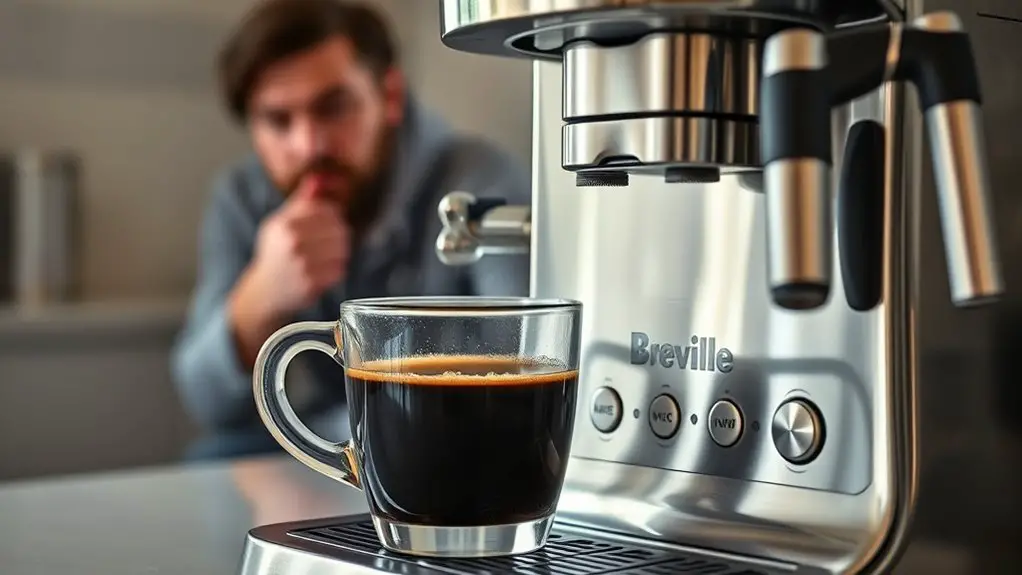If your Breville coffee maker isn't heating up, start by checking the power supply and connections—inspect the power cord for damage and guarantee it's plugged in securely. Next, clean and descale the machine regularly to eliminate mineral buildup affecting performance. Also, inspect the heating element for damage or loose connections using a multimeter. If issues persist or you hear unusual sounds, you may need professional help. Explore further to uncover more troubleshooting tips and solutions.
Common Reasons for Heating Issues in Breville Coffee Makers
When you notice your Breville coffee maker isn't heating properly, it can stem from several common issues. One potential culprit is incorrect temperature settings; if your device isn't calibrated correctly, it won't reach ideal brewing temperatures. Check your manual for recommended settings tailored to your preferred brewing techniques. Another factor could be a buildup of mineral deposits, which can hinder performance and affect heating efficiency. Regular descaling is essential to maintain your machine's functionality. Additionally, make certain that the brew basket and water reservoir are properly aligned, as misfits can disrupt heating. Finally, consider the wattage of your outlet, as insufficient power can impede the heating element. Addressing these factors can enhance your coffee-making experience and guarantee a consistent brew every time. Furthermore, steam leakage issues can also affect heating efficiency, so it's important to ensure all components are functioning correctly.
Checking the Power Supply and Connections
Ensuring that your Breville coffee maker has a reliable power supply is essential for ideal performance. Start by examining the power cord for any visible damage or fraying; a compromised cord can lead to heating issues. Next, check the connection between the power cord and the coffee maker, ensuring it's securely plugged in. If the connection appears solid, move on to inspect the outlet. Try plugging another device into the same outlet to verify it's functioning correctly. If you encounter outlet issues, it might be best to test a different outlet altogether. Once these steps are completed, you'll have a clearer picture of whether the power supply is the root cause of your coffee maker's temperature problems.
Cleaning and Descaling Your Coffee Maker
Since mineral buildup can greatly impact your Breville coffee maker's performance and temperature consistency, regular cleaning and descaling are essential. You can use various cleaning methods to keep your machine in peak condition. A common approach involves descaling solutions, which effectively remove limescale. Additionally, using eco-friendly options can help maintain your machine without harmful residues.
Here's a quick guide to help you choose the right descaling solution and cleaning method:
| Cleaning Method | Descaling Solution | Frequency |
|---|---|---|
| Vinegar | White Vinegar | Every 1-3 months |
| Commercial Descaler | Brew Express Descaler | Every 1-2 months |
| Citric Acid | Citric Acid Powder | Every 2-3 months |
| Baking Soda | Baking Soda + Water Mix | Monthly |
Inspecting the Heating Element
Inspecting the heating element of your Breville coffee maker is essential for maintaining ideal brewing temperatures. Start by unplugging the machine and allowing it to cool. Remove the water reservoir and access the heating element, typically located at the base. Look for signs of damage, such as cracks or corrosion. Use a multimeter for a heating element inspection; check continuity to verify it's functioning. If there's no continuity, it may need replacement. Additionally, check for loose connections or burnt wires. These troubleshooting tips can help you identify issues and maintain peak performance. Remember, regular inspections can prevent future problems, keeping your coffee maker brewing at the right temperature for that perfect cup. High pressure can also be a factor affecting the heating element's performance.
When to Seek Professional Help
While many issues with your Breville coffee maker can be resolved through DIY troubleshooting, there are times when seeking professional help becomes necessary. If you've followed the troubleshooting guide and the coffee maker still isn't heating up, it might indicate a deeper electrical or mechanical issue. For instance, persistent error codes or unusual sounds during operation can signal problems beyond basic repairs. If the heating element appears damaged or if you're uncomfortable working with electrical components, it's wise to consult a professional. They can perform thorough coffee maker repairs and guarantee your machine operates safely and efficiently. Ultimately, prioritizing your safety and the longevity of your coffee maker is key in deciding when to seek expert assistance. Additionally, issues such as a blown heating element may require specialized knowledge to diagnose and repair effectively.
Frequently Asked Questions
Can I Troubleshoot Heating Issues Without Professional Help?
You can absolutely troubleshoot heating issues yourself! By following detailed troubleshooting tips, you'll enhance your coffee brewing experience. Check connections, clean components, and guarantee proper settings; it's often simpler than you might think.
How Often Should I Descale My Breville Coffee Maker?
You should descale your Breville coffee maker every 1-3 months, depending on your water quality and usage. Regular descaling frequency is essential for ideal coffee maker maintenance, ensuring consistent performance and flavor extraction.
What Type of Water Is Best for Coffee Makers?
For ideal coffee flavor, use filtered water with balanced mineral content. High water quality prevents mineral buildup in your coffee maker, ensuring consistent heating and extraction, allowing you to enjoy your coffee without interruption.
Are There Specific Models More Prone to Heating Issues?
When it comes to Breville models, some tend to show common malfunctions more than others. It's wise to research specific models and read reviews, ensuring you choose one that minimizes heating issues and maximizes your coffee experience.
Does Using a Power Strip Affect My Coffee Maker's Performance?
Using a power strip can affect your coffee maker's performance by limiting its electrical load capacity. If the strip's rating is too low, it might not provide sufficient power, leading to inconsistent heating and operation issues.
